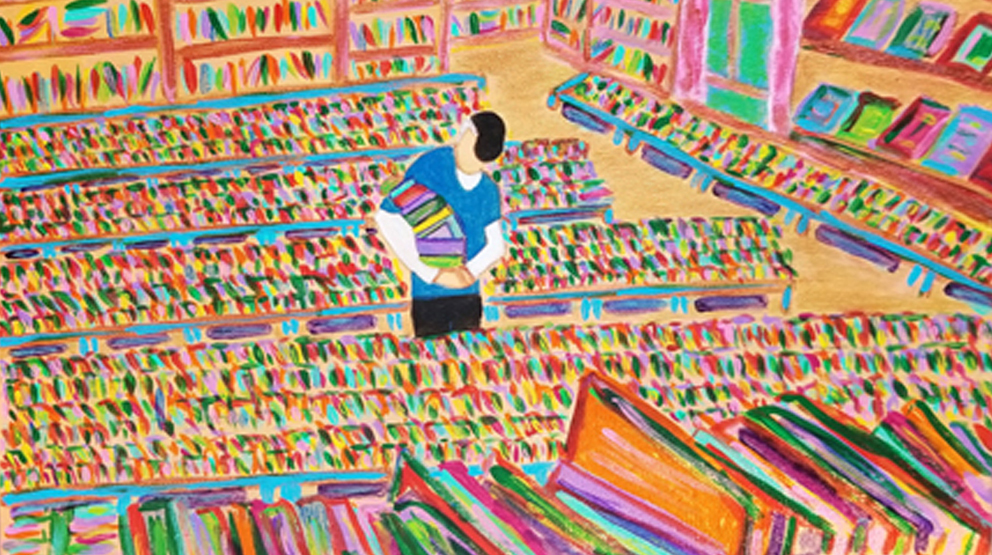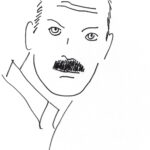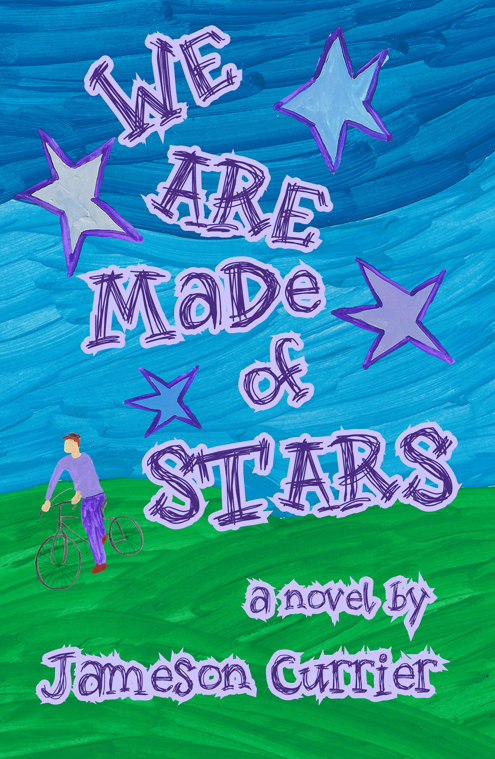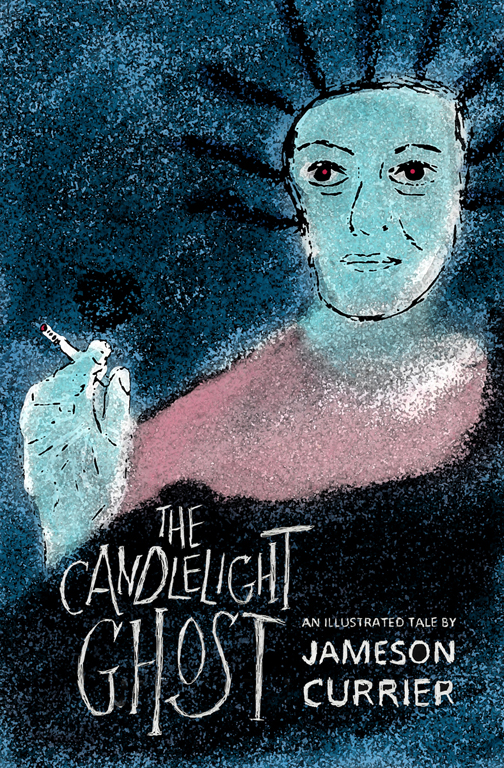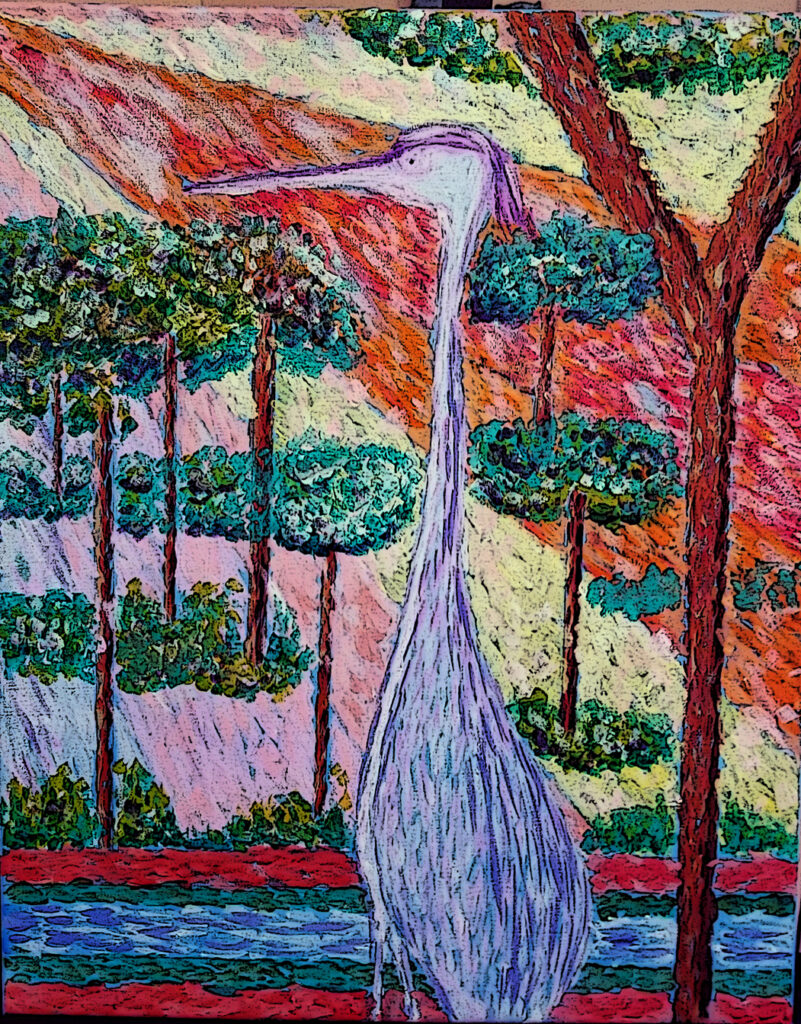
illustrations by Jameson Currier
The Magibou of Parlyaree
by Jameson Currier
Once upon a time, many years ago, in the far-off realm of Parlyaree lived a magibou. The magibou was the ugliest bird in all of Parlyaree. The magibou was tall and skinny and his feathers were gray as ash. The magibou was shunned by the other birds in Parlyaree, such as the carjay, the turken, and the pheasock. And the magibou lived alone. He had no brothers or sisters or mother or father. Not long ago there had been many magibous in the Forest of Lylies, but a Great Fire had destroyed the Forest and only one magibou had escaped because the other birds and animals had turned their backs on helping him and others in his flock.
Now the ugly magibou lived in a nestome near the Lavender Riveam in the District of Fortuni. He was not friends with the dragats and racogs and carjays. He had to forage alone for flossoms and nerrys and it often took many hours to collect enough to eat. For the magibou was blind. When he had escaped the Great Fire, the magibou had lost his sight as a flame of fire touched his eyes. Now the magibou had to rely on instinct and sounds to eat every day. But the ugly, blind magibou was not a bitter bird; as thanks for his survival from the Great Fire and finding daily sustenance by the Lavender Riveam, the magibou would sing a song. The ugly, blind magibou had a beautiful voice, the most beautiful voice in all of Parlyaree. It was high and pure and strong. And so it came to be that every morning when the sunet rose in the sky, and the magibou had finished his breckin of flossoms and nerrys, he would sing a beautiful song of thanks.
The District of Fortuni was a land of many different colored riveams. Business and agriculture in Parlyaree were governed by the guilds and associations of the mortals who resided on the lands that were divided into many districts, but the seasons and weather and the grace of all souls were overseen by the Glorias of Parlyaree, a family of immortals who resided in crystal palomes in the clouds.
The Glorias were seldom concerned with the self-governing mortals. Their powers lay in changing the seasons and weather. A handsome Filiome was the youngest Grace and the one who guarded and guided the District of Fortuni. One day the Filiome of Fortuni was floating above the Lavender Riveam and he heard the magibou singing. He had never heard such a beautiful sound before. He asked the dragats what could possibly make such a beautiful sound. And they told him it was the ugly, blind magibou who had such a beautiful voice.
So the Filiome of Fortuni went to visit the magibou at his nestem by the Lavender Riveam. He stayed and listened to the magibou singing for many hours. He fed him flossoms and nerrys and made it his purpose to help take care of the ugly, blind magibou. The handsome Filiome of Fortuni told the ugly magibou that he must come and live with him at his Crystal Palome in the clouds. He would make sure the magibou was well fed every day and he could sing for the Filiome every morning.
The ugly, blind magibou was very excited by this good news. And so he went to live in the Filiome of Fortuni’s beautiful Crystal Palome. He sang for the Filiome of Fortuni every morning. Suddenly the racogs and dragats and carjays were his friends and came to visit him at the Crystal Palome in the sky and hear him sing. Sometimes the Filiome of Fortuni was so moved and happy from the magibou’s singing, he would brush the magibou’s feathers. This is the most wonderful thing anyone can ever do for a magibou. When a magibou’s feathers are brushed the gray spindles become beautiful rainbows.
One day, as the magibou was singing, the Filiome’s older brother, the handsome, blond Efink of Alcopop, flew by the Cyrstal Palome in his ponicorn drawn cheviot. The Efink of Alcopop had never heard such beautiful singing before and he commanded his ponicorns to stop so the Efink could listen. Alcopop was a district on the far side of the Magenta Riveam, and it was a very noisy place because all of the sounds from Parlyaree fell from the mountains that surrounded Alcopop. The Efink of Alcopop sat for hours on a cloud listening to the magibou sing in the Crystal Palome. The Efink was so glad to finally hear something beautiful. He was so moved, in fact, that he flew inside the Crystal Palome of Fortuni so he could hear the magibou better. His younger brother, the Filiome, was out of his palome providing strength to guide the farmers of Fortuni who were harvesting their crops, so the Efink of Alcopop brushed the magibou’s feathers as he sang. The handsome blond Efink of Alcopop had been born with many special powers and when the magibou had finished singing his song and presenting his beautiful rainbow of feathers, the Efink said, “That was so beautiful. I must give you a gift. I will give you the gift of sight.”
The Efink of Alcopop brushed the magibou’s feathers again and suddenly the magibou could see.
The magibou opened his eyes and before him he saw the handsome and beautiful blond Efink of Alcopop. The Efink was tall and strong and had golden hair, and the Efink’s smile was so bright, that the magibou had to blink his eyes many times to believe that he was seeing a Gloria so handsome and beautiful. The magibou looked around his room in the Crystal Palome of Fortuni. He saw jars and jars of flossoms and nerrys, the Filiome of Fortuni’s boots, and several enormous stuffed chairs. Outside, through the crystal window, he could look down onto the meadows and monthills of Fortuni, and in the distance he could see the Lavender Riveam where he once nested. The magibou was so happy that he could see again that he began singing a new song for the Efink of Alcopop. When the magibou had finished his new song, the Efink of Alcopop said, “Come live with me in the sky.”
“I can’t,” the magibou said. “My home is here with the Filiome. He has been very kind to me.”
“You must come live with me,” the Efink said loudly. He was becoming angry. “I have given you the gift of sight. Your realm will be as far as you can fly and see.”
“But I can’t,” the magibou said. “Your brother has given me something far greater. He has given me the gift of life.”
The Efink of Alcopop grew furious. He had never been rejected before. And he was very jealous of the Filiome. “So be it,” the Efink said. “But you have not seen the last of me. Because of this, you will never be able to sing again.” And with that the Efink stole the magibou’s beautiful voice with a huge breath of air. Then the Efink of Alcopop flew through a wall of the Crystal Palome, shattering glass in every direction.
The magibou was shocked by the Efink’s anger. He opened his mouth and tried to sing, but not a sound came forth. The magibou sat and cried for many hours. He would not eat any of the flossoms or nerrys his friends the racogs and dragats and carjays brought to him.
When the Filiome of Fortuni returned to the Crystal Palome, he found the magibou crying. The racogs told the Filiome about the blond Efink’s visit, how the Efink grew angry and left with the magibou’s voice.
So the Filiome went out to his stables and harnessed his ponicorn and flew to Alcopop. He demanded that his sibling return the magibou’s voice. “I no longer have her voice,” the Efink said. “I sold it to our sister, the Hettie Naff of Kerterveres.”
So the Filiome went back to his ponicorn, flew beyond the Magenta Riveam to the Crystal Palome of Kerterveres in the clouds above the Great Sea of Shardas. It was a long journey to Kerterveres, and the Filiome’s ponicorn flew for hours without rest.
When the Filiome reached the Cyrstal Palome of Kerterveres, the Filiome told his sister, the Hettie Naff, “I must have the magibou’s voice back. I will pay you ten million stimbles.”
Ten million stimbles was a great amount, worth more than anything else in all of Parlyaree.
“No,” the dark Hettie Naff said. “It is worth more than that.”
“I will give you my Crystal Palome and you may guard and guide all of Fortuni as well as your own district,” the Filiome told his sister. “Please, let the magibou have his voice back.”
“It is worth far more,” the Hettie Naff of Kerterveres said.
“Then I will give you my life,” the Filiome said to his sister.
“So be it,” his evil sister said.
The Hettie Naff of Kerterveres waved her hands and there was a great eruption throughout the Great Sea of Shardas. A tornado of black water rose up into the clouds and surrounded the Filiome of Fortuni and he was carried down and under the water of the Great Sea where he died.
The Hettie Naff, now the guide and guardian of Fortuni as well as Kerterveres, took the Filiome’s ponicorn and flew to the Crystal Palome of Fortuni. When she saw the magibou, she opened the palm of her hand and gave the magibou back his voice. “Now, you will sing only for me,” the evil Hettie Naff said. And she laughed a very evil laugh.
The magibou sang a very sad song for days and days. He missed the Filiome of Fortuni very much. Finally, the Hettie Naff said, “I cannot stand it anymore. Your sad, sad songs are making me miserable. I will give you to my sibling, the Efink of Alcopop.”
But when the Efink of Alcopop heard the magibou’s sad, sad song, he, too, did not want the magibou. “Give him to our father,” the Efink suggested, “The Great Grace of Parlyaree.”
And so the Efink and the Hettie Naff journeyed into the stars to the Light Palome of their father, the Great Grace of Parlyaree. When they arrived, they found the Great Grace had been waiting for them for many days, for the Great Grace had watched everything that had happened.
“My children, my children,” he said to his children the Efink and the Hettie Naff, when they had presented him with the magibou. “Have you no conscience? I have watched you set fires and steal and swear and bicker. That is not right. And now you have killed your own brother. You must be punished. You, my child, the Efink of Alcopop, will never be able to set foot anywhere beyond the clouds. You will never again see water or soil.”
“You, my daughter, the Hettie Naff of Kerterveres, will also never see soil again,” the Great Grace said. “Nor the sky and air. You will forever be banned to live underwater, beneath the Great Sea.”
And with that, the Great Grace of Parlyaree waved his hand and the two siblings disappeared.
The Great Grace looked at the magibou and lifted him up in his huge hand.
“You must be very tired,” the Great Grace said to the magibou. “I must repay you for the troubles my children have caused you. I will grant you whatever you so wish.”
“I don’t think you can do that,” the magibou said. “What I want you cannot do.”
“But what is it?” the Great Grace asked.
The magibou answered, “I would like the Filiome of Fortuni to be alive again. He gave me life. He taught me how to love. He became my family when my family was lost to me. I want to live with him forever in his Crystal Palome.”
“I am a very great and powerful Gloria,” the Great Grace said. “Never underestimate wisdom or age. I gave you the voice which you use to sing. I can also give life back to my son. I have seen how much my son loves you and how much you love my son. The best families are the chosen ones. Because you have been so loyal to my son, the Filiome of Fortuni, I will grant you this special wish and you both shall guard and guide over all of Parlyaree. And you both shall live in the Light Palome of Parlyaree.”
And so the Filiome of Fortuni was returned back to life and given the newly established title the Grace of Light. The magibou was transformed into a handsome omee and named the Canto Journo. And together they lived happily ever after in the Light Palome of Parlyaree, which sometimes, on a clear, cloudless night looks like a tiny and beautiful, shooting star.
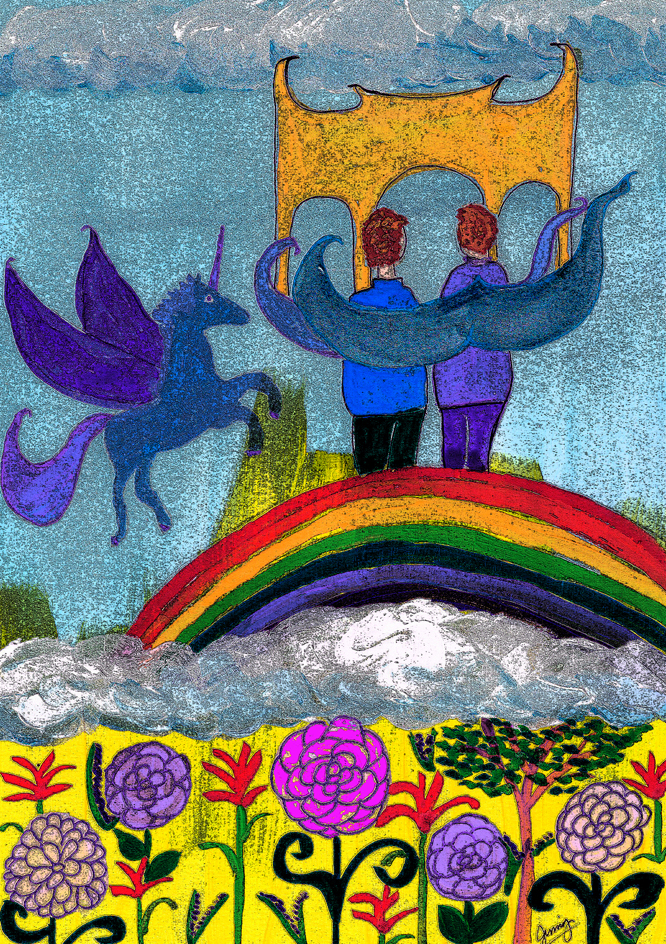
___________________________________________
GLOSSARY
| alcopop – | Polari for vinegar |
| breckin – | the meal before breakfast |
| carjay – | a bird, part cardinal, part blue jay |
| cheviot – | a brand name chariot |
| dragat – | an animal, part dragon, part cat |
| efink – | Polari for knife |
| filiome – | Polari for young man |
| flossoms – | a type of flowering blossom |
| fortuni – | Polari for gorgeus, beautiful |
| hettie – | Polari for straight |
| kerterveres – | Polari for sinners |
| lylies – | Polari for legs, trousers |
| monthill – | not quite a mountain, though larger than a hill |
| naff – | Polari for wicked |
| nerrys – | a plant, part nut, part berry |
| nestome- | a nest which is a home |
| palome – | a homey palace |
| parlyaree – | alternate spelling of Polari |
| pheasock – | a bird, part pheasant, part cockatoo |
| ponicorn – | a baby unicorn that flies |
| racog – | an animal, part racoon, part dog |
| riveam – | larger than a stream, but smaller than a river |
| shardas – | Polari for sorrows |
| stimbles – | the currency of Parlyaree |
| sunet – | a small, planetary sun |
| turken – | an animal, part turkey, part chicken |
__________
About the Story
The first draft of this story was written in 1989 while I was living in a cottage in New Hope, PA. I wanted to write a children’s story. My inspiration was the song “Meadowlark,” a musical theater piece written by Stephen Schwartz for the musical The Baker’s Wife. The original title was “The Magilark of Emperata” and was set in the fantastical world I had created in my mind named Emperata. This tale has gone through many revisions, including the addition of many Polari (British gay slang) terms added in the 2010s. The last revision was made in 2022. The illustrations were created in 2019 and 2024.
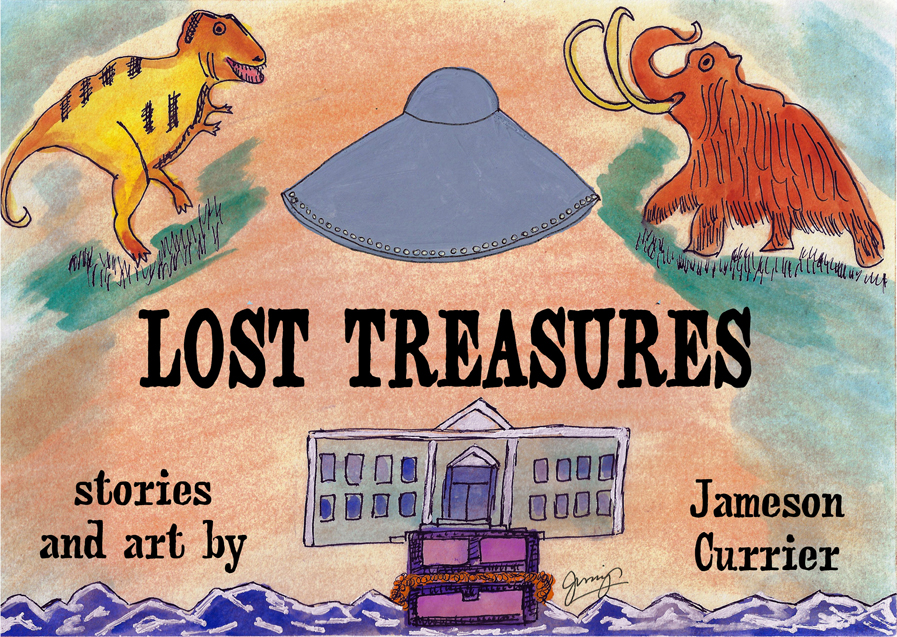 “Lost Treasures” is Jameson Currier’s ongoing project to rediscover, revisit, and illustrate his early writings.
“Lost Treasures” is Jameson Currier’s ongoing project to rediscover, revisit, and illustrate his early writings.
Jameson Currier is the author of eight novels, five collections of fiction, three illustrated tales, and a memoir.
